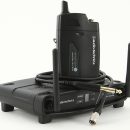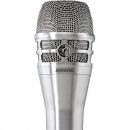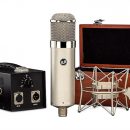 Why You Should Know Him
Why You Should Know Him
Robert Fripp, the sound scientist of the progressive rock community, is an English guitar player most notable for delivering his unique, and almost unknown, sound display in any group that he played with throughout the 1970s, ‘80s, and even into the ‘90s. His most frequently reuniting band is his own, King Crimson, formed in 1968 with Michael Giles, Greg Lake, Peter Sinfield, and Ian McDonald. Fripp was making himself known to many musicians throughout the ‘70s by breaking conventional sound boundaries and playing with many popular and talented musicians.
King Crimson hadn’t necessarily made its mark in the progressive rock world at the time of their first separation, but they were definitely heard, and Fripp was not finished making music. In fact, Fripp notoriously created a tape delay system for his playing, giving him an upper-hand for making unheard sounds and delays with his guitar- this came to be known as “Frippertronics”. The sound was almost as if he had a super-delay, and it allowed him to manipulate the sound of a guitar in ways that hadn’t been done before. This concept came around 1973 and was used in many of his collaborative works with other known musicians such as Brian Eno and Peter Gabriel.
In 1980, Fripp and his sound prospered immensely. After contributing the incredible, haunting lead guitar melody work on David Bowie’s 1977 hit, “Heroes,” Bowie included Fripp on a few tracks from 1980’s fantastic album, Scary Monsters, including the hit single, “Fashion.”
In 1981 King Crimson reunited for the fourth time but with different members and a different dynamic, adding Tony Levin to contribute backing vocals on top of his bass playing, but broke up again in 1984, a year before Fripp began heavily using the cross-picking technique in his playing. This was peculiar, yet distinctive, because at the time it was a technique used mostly for mandolin playing, as one would roll or flat-pick across three or so strings. However, even without King Crimson, Fripp continued to prosper in his music by taking a teaching position at the American Society for Continuous Education in Claymont Court, West Virginia- and yes, his lessons included cross-picking.
Fripp may not think so, but one could say that his sound and talents prospered greatly in the ‘80s, and have since contributed influence to countless amounts of tone, techniques, sounds, and styles.
The Gear
The ‘80s was an interesting time for Fripp and his equipment. His instrument of choice was a Roland GR-300 guitar synthesizer controller; a double humbucker and lighter instrument than his previously used Gibson Les Paul. What was peculiar, however, was that he only used the synthesizer sound for soloing as opposed to the humbuckers- with the exception of a few songs such as “Indiscipline,” “Requiem,” and “Nuages (That Which Passes, Passes Like Clouds).”
The Roland guitar synth was played out of a Roland JC-120 amplifier. He instead used a fuzz pedal and Electro-Harmonix Small Stone phaser pedal, and an EMS VCS3 analog synth to get his favorite tone, that which was used in many of his works with Brian Eno.
In regards to “Frippertronics,” the guitar scientist used Revox A77 and B77 reel-to-reel ¼” tape decks to record and replay the sounds how he wanted.
Where Is He Now?
Fripp continued his busy lifestyle by keeping up with his old colleagues and even touring and recording with them as well. He worked with Porcupine Tree from 2007 until 2009 and even brought back King Crimson as a seven-piece band from 2008 to 2010.
In an interview published in August of 2012, Fripp stated that his professional musicianship has come to an end, and he would be retiring from the music world. This was due to a long-standing difference with Universal Music Group, stating that working with the industry has become “a joyless exercise in futility”. This ‘retirement’ was short-lived and Fripp announced in 2013 the return of King Crimson with a new line up of “four Englishmen and three Americans.”
This new unit included Bill Reiflin and Tony Levin in it as well. The band went on to tour in 2014 and 2015 with a set list that reconfigured the band's older material. In 2016, former Lemon Trees/Beady Eye drummer Jeremy Stacy would fill in for Reiflin while he was on a brief leave.
Regardless of his current activity in the music world, his previous work and efforts will go forever remembered as some of the most influential pieces of work from the ‘70s, ‘80s, and even more contemporary times as well.
Back to the Top 40 Under-Appreciated Guitarists of the 1980s.













